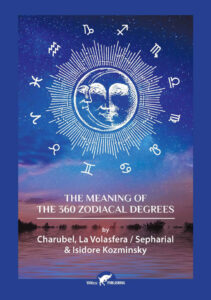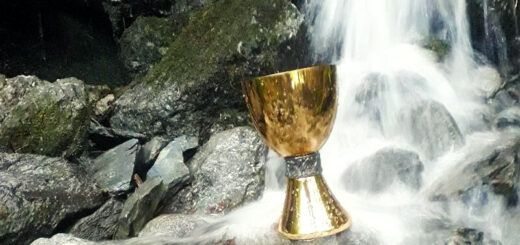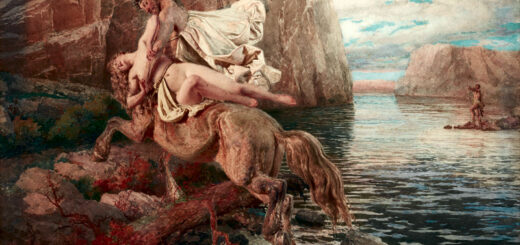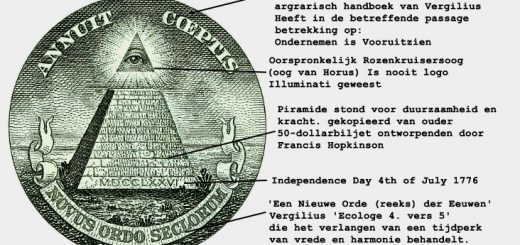Leshy, the Lord of the Russian Forest
The Leshy or Lyeshy (Belor: лясу́н Lyasun, лесаві́к Lesovik; Ukr. лісови́к Lisovik; Pol: Laskowiec) is a forest spirit, widely known among Russians (especially in the North), and to a lesser extent representations about him were common among Eastern Belarusians and Eastern Ukrainians. Written data on the creature appear no sooner than the late 18th and early 19th century. Many unique details were collected by W.R.S Ralston in his Songs of the Russian People – see most of the informtion below.
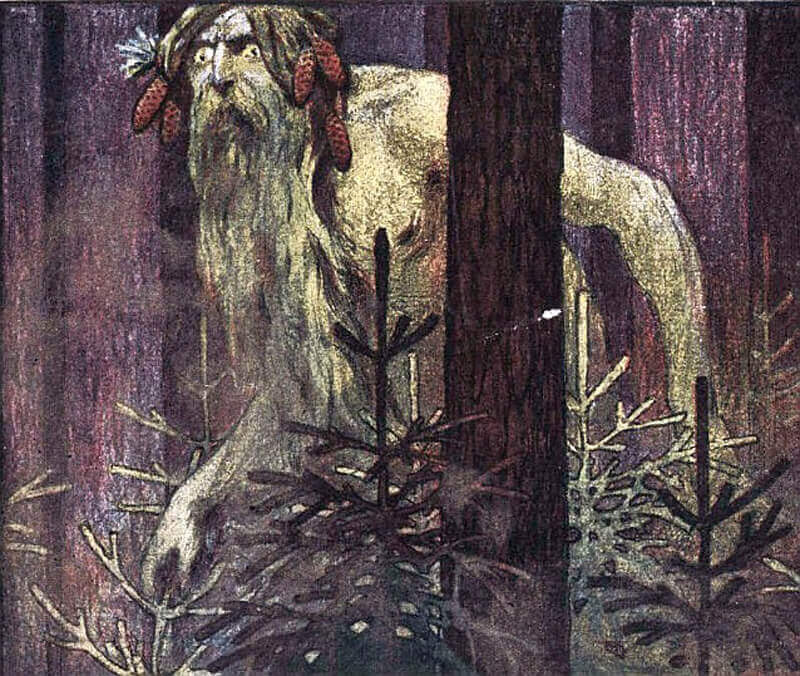
Leshy drawing 1906
The Leshy usually appears as a solitary creature, though in some accounts, he is described as having a wife (Leshachikha, Leszachka, Lesovikha and also, the Lisunka or the Kikimora of the swamp) and – sometimes kidnapped -children (Leshonki, Leszonky, Leshachata).
A Little-Russian story, closely resembling one told in Germany of a Holzweibchen, tells how a woman one day found a baby Leshy lying–naked on the ground and crying bitterly. So she covered it up warm with her cloak, and after a time came her mother, a Lisunka, and rewarded the woman with a potful of burning coals, which afterwards turned into bright golden ducats.
Sometimes the Leshies carry off mortal maidens, and make them their wives. But whether they intermarry or no, their weddings are always attended by noisy revels and by violent storms. If the wedding procession traverses a village, many of the cottages will be injured: if a forest, a number of its trees will fall.
A peasant will rarely dare to lie down to sleep in a forest path, for he would be afraid of a wood-demon’s bridal procession coming that way and crushing him in his slumbers. In the district of Archangel a whirlwind is set down to the wild dancing of a Leshy with his bride. On the second day after his marriage the Leshy, according to the custom prevalent in Russia, goes to the bath with his young wife, and if any mortal passes by at the time, the newly-married couple splash water over him, and drench him from head to foot.

Viktor MikhaylovichVasnetsov (1848-1926), Leshy. Costume design for the opera “Snow Maiden” by N. Rimsky-Korsakov. Theatrical scenic painting, 1885, Russia, State Tretyakov Gallery, Moscow
As the Vodyany haunts the waters, so does the Leshy make the lyes (“forest”) his home. In Slavic beliefs he is the demon of the forest, its master and the ruler of all the animals living in it. He is also revered to as a demon of the souls of dead people.
The Leshy is often malicious, and to those who do not conciliate him be often does much mischief. One of his tricks is to suck their milk from the cows. In the Olonetsk district it is believed that a herdsman ought to give one cow every summer to the Leshy.
If he fails to do so, the revengeful spirit will destroy the whole herd. In the district of Archangel it is held that if the herdsmen succeeds in pleasing the Leshy, he will see to the pasturing of the village cattle. In Belarus, on the other hand, he is supposed to be the protector of the wolves.
In the districts of Kief and Chernigof the peasants divide the Leshies into two classes, those belonging respectively to the woods and those who belong to the cornfields. The one consists of giants of an ashy hue; the other of beings who, before the harvest, are of the, same height as the growing corn, and, after it, dwindle away till they are no higher than the stubble.
Appearances
Though a Forest-demon the Leshy was supposed by some 19th century critics to be one of the spirits who belong to the realm of the clouds and storms, and they hold that their hypothesis is confirmed by the fact that he can assume different shapes, whirlwind, humanoid, plant or animal or as a faceless spirit, and alter his stature at will, at one time making himself taller than the trees of the forest, and at another shorter than the grass of the field.
He often appears as a peasant dressed in a sheepskin, but ungirdled,–as is always the case with evil spirits,–and with the left skirt crossed over the right. One of his peculiarities is, that he never has any eyebrows or eyelashes.
Sometimes he has but one eye. When he appears in his own shape, and without clothes, be greatly resembles the medieval pictures of the devil. From his forehead spring horns, his feet are like those of a goat, his head and body are covered with shaggy hair, which is sometimes as green as that of the Rusalkas, his fingers are tipped with long claws.
In mythological stories – and depictions by artists – the Leshy also appears as a phytoanthropomorphic creature. It happens that it is entirely a plant object – a tree (pine, spruce, birch, oak, aspen), bush, stump, leaf, moss, fungus, etc. Further, he begins to show human characteristics: his shape, with branches like hair. On the other hand, anthropomorphism may dominate and the connection with vegetation may appear in considerable detail: long disheveled green hair as branches of a tree or bush, a lichen beard, moss-covered clothing of wood color and structure, a moss-covered face, skin thick as bark. Finally, plant features can be reduced to attributes: a club or baton in his hands, a green beard, eyes and clothes. The association with the forest is supplemented by the ability of a Leshy to whip a person with rods, to make noise, to hum, to crack the trees. Sometimes the Leshy personifies the whole forest, fills its entire space.
Behavior

Leshy by Ivan Sydorovych Yizhakevych (1864–1962) Ukrainian painter and writer
Leshies frequently quarrel among themselves, using as their weapons huge trees and masses of rock. The devastation, usually attributed to hurricanes, are in reality, the peasants say, due to these mighty combatants of the forest world.
When the Leshy goes round to inspect his domains, the forest roars around him and the trees shake. By night he sleeps in some hut in the depths of the woods, and if by chance he finds that a belated traveler or sportsman has taken up his quarters in the refuge he had intended for himself, he strives hard to turn out the intruder, sweeping over the hut in the form of a whirlwind which makes the door rattle and the roof heave, while all around the trees bend and writhe, and a terrible howling goes through the forest. If, in spite of all these hints, the uninvited guest will not retire, he runs the risk of being lost next day in the woods, or swallowed up in a swamp.
All the birds and beasts which inhabit the forest are under the protection of the Leshy. His favorite is the bear, his only servant, who watches over him when he has taken too much of the strong drink he loves so well, and guards him from the assaults of the Water-Sprites.
When the squirrels, field-mice, and some other animals go forth in troops upon their periodical migrations, the peasants explain the fact by saying that the Leshies are driving their flocks from one forest to another. In 1843 a great number of migrating squirrels appeared in certain districts of Russia, and the neighboring peasants said that it was because a Leshy in the Vyatka district had gambled away all his squirrels to a brother demon in that of Vologda, and the lost property was on its way to its new master.
Similar gambling transactions are frequent among the water-sprites. Fishermen know at once why it is that certain fish suddenly desert particular spots. They have been staked and lost by the local Vodyany. But neither the Leshy nor the Vodyany will use a pack of cards in which any clubs occur. Any thing like the sign of the cross is distasteful to Slavic demons.
Lord of the Forest

Leshiy by Yegor Kovrigin (1819-1853)
A sportsman’s success in the woods depends, to a great extent, on his treatment of the Leshy. In order to please that wayward spirit, he makes an offering of a piece of bread, or a pancake, sprinkled with salt, and lays it on the stump of a tree. The Perm peasants offer up prayers once a year to the Leshy, presenting him with a packet of leaf-tobacco, of which he is very fond.
In some districts the hunters make an offering to the Leshy of whatever animal they first bag, leaving it for him in, an oak forest. One of the incantations intended to be used by a hunter calls upon the “Devils and Leshies” to drive the hares into his power, and its magic force is supposed to be so great that the Wood-Demons must obey.
The Leshy is very fond of diverting himself in the woods, springing from bough to bough, and rocking himself among the branches as if in a cradle, whence in some places he is called Zuibochnik, (zuibka = “a cradle”). At such times he makes all manner of noises, clapping his hands, shrieking with laughter, imitating the neighing of horses, the lowing of cows, the barking of dogs. So loud is his laughter, say the peasants, that it may be heard for versts around (1 verst = 0,66 mile).
In their opinion, when the winds make the woods resound, the voice of the Leshy may be heard in what ignorant people might think was the creaking of branches or the crashing of stems; the sounds, also, which are erroneously attributed to an echo are in reality the calls of demons, who wish to allure an unwary sportsman or woodcutter on to dangerous ground, with the intention of tickling him to death if they can get hold of him.
For in this respect the Leshies resemble their sisters the Rusalkas. In olden days, when forests were larger and denser than they are now, the Leshy used to be constantly deluding travelers, and making them lose their way. Sometimes he would alter the landmarks, or would assume the likeness of some tree by which the neighbors were accustomed to steer.
Sometimes he would himself take the form of a traveler, and engage a passer-by in conversation. His victim would chat away unconcernedly, till, all of a sudden, he found himself in a swamp or ravine. Then a loud laugh would be heard, and, looking round, he would see the Lyeshy at a little distance grinning at him. Sometimes by night a forest-keeper would hear the wailing of a child, or groans apparently proceeding from some one in the agonies of death.
His only safe course under such circumstances was to go straight onward, without paying any attention to those noises. If he followed them he would probably fall into a foaming stream, which rushed along where no stream had ever been seen before.
Wherever the Leshy goes, he always tries to leave no track behind, covering the traces of his footsteps with sand, or leaves, or snow. If by any chance a passer-by strikes upon the Leshy’s recent trail, he becomes bewildered, and does not easily find his way again. His best plan is to take off his shoes and reverse their linings, and it may be as well also to turn his shirt or pelisse inside out.
Besides making travelers lose their way, the Leshy amuses himself in many ways at their expense, blowing dust into their eyes and their caps off their heads, freezing their sledges tight to the ground, and so forth, so that a popular saying conveys this advice, “Don’t go into the forest; the Leshy plays tricks there!” Worse than that, he often brings illness upon them, so that when any one falls ill after returning from the woods, his friends say, “He has crossed the Leshy’s track.” In order to get cured he takes bread and salt, wraps them in a clean rag, and carries them to the forest. On his arrival there he utters a prayer over his offering, leaves it as a sacrifice to the Leshy, and returns home with the firm conviction that he has left his illness behind him.
Invoking the Leshy
If any one wishes to invoke a Leshy he should cut down a number of young birch-trees, and place them in a circle with their tops in the middle. Then he must take off his cross, and, standing within the circle, call out loudly, Dyedushka! (“Grandfather!”) and the Leshy will appear immediately. Or he should go into the forest on St. John’s Eve, and fell an aspen, taking care that it falls towards the East.
Then he must stand upon the stump, with his face turned eastward, bend downwards, and say, looking between his feet, “Uncle Lyeshy! appear not as a gray wolf, nor as a black raven, nor as a fir for burning: appear just like me!” Then the leaves of the aspen will begin to whisper as if a light breeze were blowing over them, and the Leshy will appear in the form of a man. On such occasions he is ready to make a bargain with his invoker, giving all kinds of assistance in return for the other’s soul.
Alternative names
The Leshy is known by a variety of names, name variations and spellings including the following:
Borovoi (Russian: Боровой, Polish: Borowy) “(he) of the forest”
Dedushka-lesovoi or Lesnoi dedushka/ded (Russian: Дедушка-лесовой, Лесной дедушка/дед, Belarusian: Лясны дзед, Polish: Leśny dziad) “forest grandfather”
Gayevoi (Russian: Гаевой, Polish: Gajowy) “[he] of the grove”
He (Russian: он) also used for the devil, based on superstition prohibiting invocation of evil
“He himself” (Russian: он сам) like “he”
Les chestnoi (Russian: Лес честной) “honorable one of the forest”
Les pravedniy (Russian: Лес праведный) “righteous one of the forest”
Leshak (Russian: Лешак, Serbo-Croatian: Lešak, Лешак)
Leshy (Russian: Леший, Belarusian: Лешы, Polish: Leszy, Serbo-Croatian: Lešij, Лешиј)
Lesnik (Russian: Лесник, Polish: Leśnik, Bulgarian: Лесник, Serbo-Croatian: Lesnik, Лесник)
Lesnoi dukh (Russian: Лесной дух) “forest spirit”
Lesnoi dyadya (Russian: Лесной дядя) “forest uncle”
Lesnoi khozyain (Russian: Лесной хозяин) “forest master”
Lesnoi zhitel‘ (Russian: Лесной житель) “forest dweller” or “woodsman”
Lesny muzhik, “forest man”
Lesovik (Russian: Лесовик, Belarusian: Лесавік, Ukrainian: Лісовик, Serbo-Croatian: Lesovik, Лесовик)
Lesovoi (Russian: Лесовой, Serbo-Croatian: Lesovoj, Лесовој)
Lesun (Russian: Лесун, Belarusian: Лясун)
Mežainis, “forester”
Miškinis, “woodsman”
Miško velnias, “forest devil”
Vir’ava (Erzya: Вирьава) “forest mother”
You may also like to read:
water spirits in Eastern European folklore | list of 18 species
Genius loci “the spirit of the place”
A Huldra, Hulder or Skogsrå a female forest spirit in Scandinavia
Dybbuk or Dibbuk – the sticky ghost of the Ashkenazi
Huldufólk | also called Högfolk is the mythical race of Elves of Iceland
The incubus or succubus – nightmare or astral sex date?
Bloody Mary, the cocktail and the gruesom phantom in the mirror…
Witches ointment
The real vampire in Russia and Slavonic countries
Historical werewolf cases in Europe
Mountain spirits
Wild Man or Woodwose



